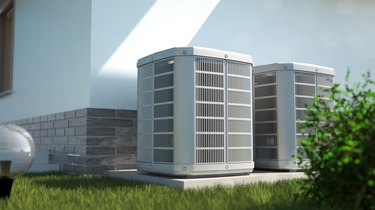
If you have central air conditioning in your home, it has many working parts to keep the cool air flowing through your living space. While you may have heard of register boosters that boost air from underperforming registers, an air conditioner capacitor actually boosts the system to get the motor rotating, and another capacitor, or booster, helps to keep your house cool.
Tip
Boosters for a central air conditioning system are cylinder-shaped devices inside the main air conditioning housing that resemble a battery. They store the energy needed to help the motor start running and continue to run.
Video of the Day
Types of Capacitors
There are two types of boosters, or capacitors, that boost your central air conditioner to help it do its job. One is the start capacitor. This kicks into gear when the indoor temperature creeps above the level where you have your thermostat set and the system needs to start-up.
Video of the Day
Your home's electrical system may not always be able to handle the massive amount of electricity needed to boost the rotation of the motor and get it going. That electrical charge boosts the motor with the needed amount of energy, and then it shuts off.
There's a second capacitor that provides the system with the energy needed to keep the air conditioner humming. While the system is running, the capacitors are storing energy for the next time a boost is needed. The boosters don't actually increase voltage, however. Any higher voltage created is generated from the motor, not the booster or capacitor.
Do Capacitors Fail?
Capacitors, like other components, eventually need to be replaced. There are signs that a capacitor is failing, including:
- Your air conditioner may be running, but no cold air is coming out of the vents.
- Your air conditioner starts and stops repeatedly.
- Your air conditioner makes grinding or clicking noises when starting.
Booster failure often occurs during heat waves. It can also be caused by an overloaded circuit in your home or a power surge in the energy grid that supplies your home.
Replacing a capacitor is much cheaper than replacing the compressor in your air conditioner. Replacing a capacitor does require connecting to the correct wires in your air conditioning system. There's a lot of electricity and safety involved, and many HVAC professionals recommend that you call a professional to install a new booster or capacitor.
Why Have a Capacitor?
Not every home air conditioning system has two capacitors. Some have one, and some don't have them. If your air conditioner doesn't have a capacitor, or a hard-start kit, installing one can not only help your AC start and run more smoothly but it can help it last longer.
If your AC is old and not turning on properly or if the AC compressor is making clicking noises, a capacitor may help prolong the life of the compressor. Also, if you notice that your compressor is causing your circuit breaker to trip, then your AC is using too much electricity to start, and you may want a capacitor.
If you have installed a new central AC unit that doesn't come with a capacitor, adding a capacitor may make your new unit last longer. It may also prevent problems during heat waves when you don't want your AC to fail.